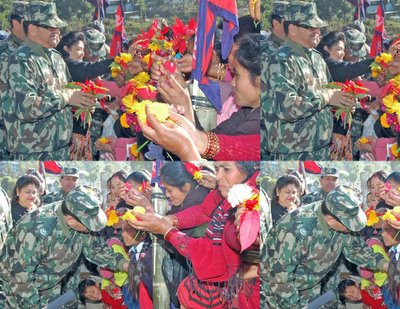
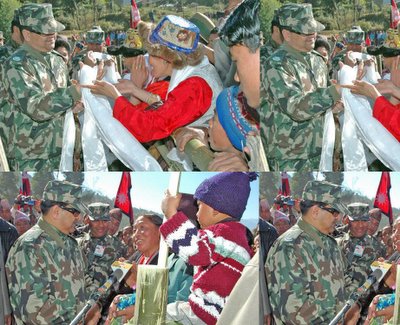
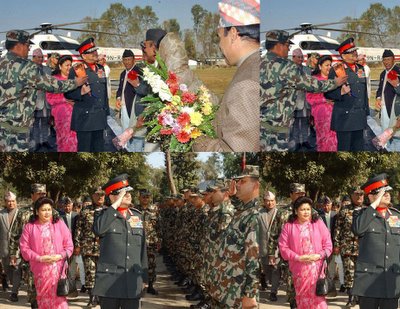
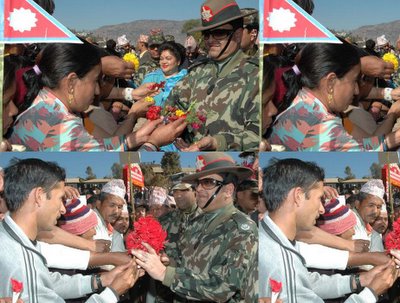
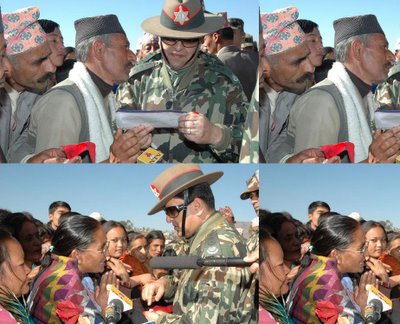
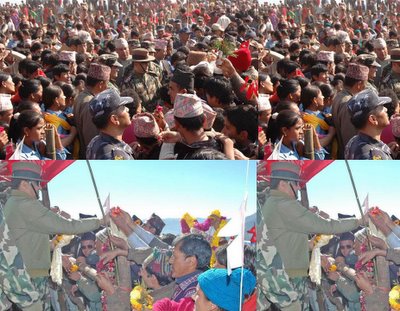
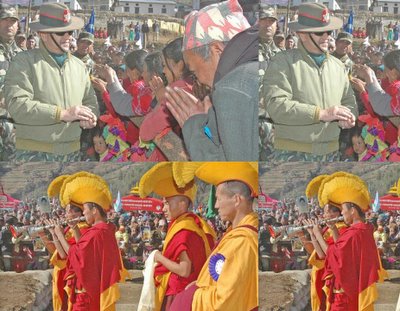
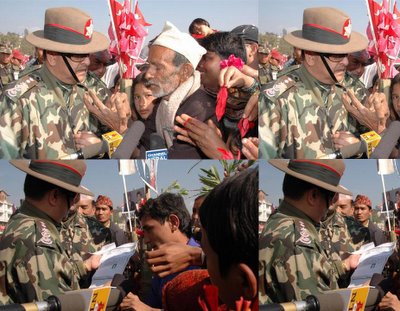
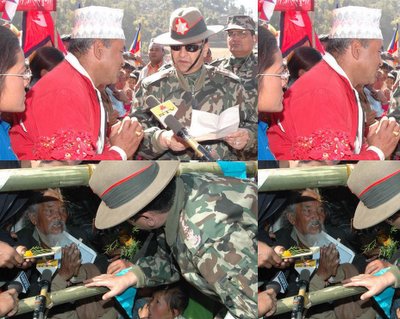
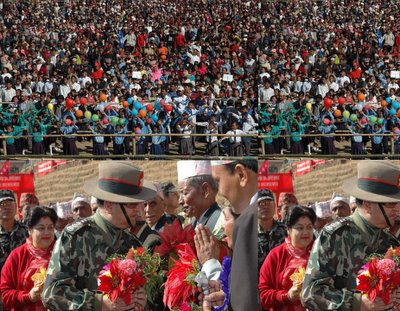
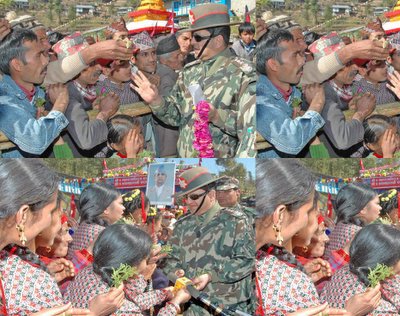
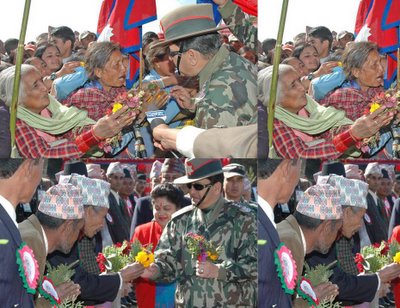

Yesterday I painted three worst case scenarios:
- The king imposes martial law. That would hurt him further, but he could do it as an act of desperation.
- The king could get ousted, and the army could stage a coup and take over. Pyar Jung could end up the Nepali Musharraf.
- The king could get ousted, the army could get disbanded, and the Maoists could decide they want a communist republic after all, and they want it now. Nepal could end up a one party state of the Maoists.
We are up against the king, and he will do what he has said he will do. He has this thing called a roadmap. He asked for three years in which to hold elections. I don't think there is a secret military crackdown in the offing. I don't think he is on his way to ban political parties. But he is going to be uncompromising with his roadmap.
In his mind he has been adhering to the 1990 constitution.
The parties accuse him of dissolving the parliament in 2002. It was not him, it was Deuba. That is just a fact, kind of like saying Mount Everest is 8,848 metres high.
Then Deuba got dismissed six months later. What were the options? Could Deuba have stayed Prime Minister indefinitely until elections were held, which might have been two or five years from then, or never? I don't think so. Deuba's ouster also I don't question.
Then he invited the formation of an all party government. Why did the parties not take it?
Look at the current roadmap of the seven party alliance. One, revive the House. Two, form an all party government. Three, hold peace talks with the Maoists. Four, hold elections to a constituent assembly. If they had this roadmap right when the king invited the formation of an all party government, they could have taken it, right? Perhaps. But they did not have this roadmap back then. Back then none of the big parties were for a constituent assembly. The Congress and the UML were totally committed to the 1990 constitution.
All this I am saying within the framework of the 1990 constitution. I don't like that document. I fundamentally disagree with it. So none of these apply to me. But they apply to parties that as late as 2004 were for the 1990 constitution.
Political confusion led to constitutional confusion led to chaos.
I start with the facts on the ground. The Universal Declaration of Human Rights is the fundamental law of the planet. Nepal has had the worst human rights violations of any country on the planet on this king's watch. Some people claim Nepal is not a signatory to the International Criminal Court. Do you think Saddam is at the Hague? A country can set up its own tribunal and punish the pepetrators. Saddam is being tried for crimes he committed in the early 1980s.
You look at the physical terror, the killings, the disappearances, you look at the attacks on free speech, free assembly. Journalists get harassed. Party rallies get disrupted.
Do we accept the 1990 constitution? And has the king been acting within the spirit of the 1990 constitution? The answer to both is no.
I have made it clear my disagreement with the House revival idea. But it is for the seven party alliance to decide exactly what route they will take. I intend to support the alliance in all ways I can.
I wonder if the parties will feel safer with a House around. If there is a House of 205, then it becomes harder for the king or the army to try anything funny. Is that the idea?
The reason for House revival can not be constitutional because there is nothing in the 1990 constitution that allows that. The reason can not be political because if the goal is a constituent assembly, you get there faster when you don't revive the House. So it must be safety concerns.
With a House in the picture, the seven parties will feel bolder in comparison to the other political forces in the country. That must be the reasoning.
But the king's attacks keep being political. When parties organize rallies, he organizes a trip to the eastern districts, for the benefit of the TV cameras.
The monarchy must be a strange institution. People react to it in strange ways.
We are up against the king. His primary attacks are going to be political. He is going to stick to his roadmap.
February 8 will be a major turning point. If he can get even 30% of the voters to show up, he can claim a small victory. If nothing else, he buys time. But if all the major parties boycott the polls, then he has already lost. Because this conflict is not constitutional, it is political.
Another reason for House revival might be that the parties that have split secretly hope to reunite, perhaps. That might be easier to do with a revived House.
Yet another reason might be that the democrats want to get even with the king and the Maoists. 2/1 was extremely unreasonable. The Maoist call for a communist republic has been unreasonable. Payback time: the parties are also going to be a little unreasonable. They are going to want the House revived.
A few damaged buildings here and there, a rally here, a rally there: if that were to continue, the king will just stick to his roadmap. I don't think he will budge. Instead he will claim the Maoists are still a menace, and that justifies his histrionics, and look at the rallies, who says there is no democracy!
But if a million people were to gherao the Narayanhiti, he will have few options left. At that point the parties will have the option to negotiate with him, or they could decide to not negotiate at all. At that point things still look a little murky. But I feel that is the direction we are headed in.
My emphasis has been that the movement has to attain clarity before it can achieve a conclusion.
The seven party alliance has it tough. The work they are doing is not easy. Their resources are limited. Much is at stake. They are taking several risks. All democrats have to be supportive. They are our leaders. They are the best we have, and they are good. They are more in tune with the ground realities than anyone in the diaspora. Their political acumen is sharp.
The struggle is political. This is movement time. And the diaspora has to extend all help it can.
My Proposal To The Saturday Symposium At Columbia
In The News
Ten Maoists killed in Tanahun clashes: MoD NepalNews
Their Majesties visit Diktel
Seven parties show ‘strength’ in Janakpur
India, China discuss Nepal situation in Beijing
NHRC holds talks with defence, home secretaries
RPP Rana faction files petition against special general convention
Missing security personnel come into contact: Police
Conflict hits Nepali economy hard: Rahman
TU approves law to give autonomy to colleges
Conflict-hit children facing difficulties in the capital: Report
Students unveil protest programme to boycott municipal polls
Ten Maoists killed by security forces in west Nepal Outlook (subscription), India
Maoist Rebels Raid Western Nepal Town, Several Policemen Missing
Monarchy Will Step Down By Mid-February: MK Nepal NewsLine Nepal, Nepal
Alliance showdown in Janakpur
China, India hold talks in Beijing about situation in Nepal India Daily, NJ
Visitors
| 22:31 | Ameritech, United States |
| 00:24 | University of California, Berkeley, United States |
| 03:54 | Pacific Century Matrix, Hong Kong S.A.R. |
| 04:05 | Communications and communicate, Nepal |
| 04:13 | British Telecommunications plc, United Kingdom |
| 04:56 | Latvijas Universitate, Latvia |
| 05:25 | Telenet, Belgium |
| 05:31 | Noos, France |
| 09:42 | Smart Telecom Holdings, Ireland |
| 09:48 | Mercantile Communications Pvt. Ltd., Nepal |
| 12:21 | Telia Network Services, Sweden |
| 13:41 | Tele2, Switzerland |
No comments:
Post a Comment